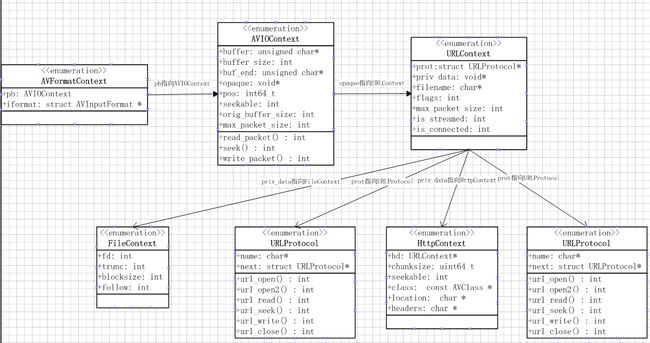ffmpeg系列-协议操作解析-AVIOContext,URLContext,URLProtocol,HTTPContext
1.协议操作对象结构
协议操作对象结构:
协议操作的顶层结构是AVIOContext,这个对象实现了带缓冲的读写操作;FFMPEG的输入对象AVFormatContext的pb字段指向一个AVIOContext。
AVIOContext的opaque实际指向一个URLContext对象,这个对象封装了协议对象及协议操作对象,其中prot指向具体的协议操作对象(如URLProtocol),priv_data指向具体的协议对象(如HTTPContext或者FileContext)。
URLProtocol为协议操作对象,针对每种协议,会有一个这样的对象,每个协议操作对象和一个协议对象关联,比如,文件操作对象为ff_file_protocol,它关联的结构体是FileContext。http协议操作对象为ff_http_protocol,它的关联的结构体是HttpContext。
2.代码分析
2.1初始化AVIOContext函数调用关系
初始化AVIOFormat函数调用关系:
我们先从下面到上面来分析源码。先分析协议中具体实现以及URLProtocol以及URLContext。
URLProtocol是FFMPEG操作文件的结构(包括文件,网络数据流等等),包括open、close、read、write、seek等操作。
在av_register_all()函数中,通过调用REGISTER_PROTOCOL()宏,所有的URLProtocol都保存在以first_protocol为链表头的链表中
URLProtocol结构体的定义为:
typedef struct URLProtocol {
const char *name;//协议的名称
//各种协议对应的回调函数
int (*url_open)( URLContext *h, const char *url, int flags);
/**
* This callback is to be used by protocols which open further nested
* protocols. options are then to be passed to ffurl_open()/ffurl_connect()
* for those nested protocols.
*/
int (*url_open2)(URLContext *h, const char *url, int flags, AVDictionary **options);
int (*url_accept)(URLContext *s, URLContext **c);
int (*url_handshake)(URLContext *c);
/**
* Read data from the protocol.
* If data is immediately available (even less than size), EOF is
* reached or an error occurs (including EINTR), return immediately.
* Otherwise:
* In non-blocking mode, return AVERROR(EAGAIN) immediately.
* In blocking mode, wait for data/EOF/error with a short timeout (0.1s),
* and return AVERROR(EAGAIN) on timeout.
* Checking interrupt_callback, looping on EINTR and EAGAIN and until
* enough data has been read is left to the calling function; see
* retry_transfer_wrapper in avio.c.
*/
int (*url_read)( URLContext *h, unsigned char *buf, int size);
int (*url_write)(URLContext *h, const unsigned char *buf, int size);
int64_t (*url_seek)( URLContext *h, int64_t pos, int whence);
int (*url_close)(URLContext *h);
int (*url_read_pause)(URLContext *h, int pause);
int64_t (*url_read_seek)(URLContext *h, int stream_index,
int64_t timestamp, int flags);
int (*url_get_file_handle)(URLContext *h);
int (*url_get_multi_file_handle)(URLContext *h, int **handles,
int *numhandles);
int (*url_get_short_seek)(URLContext *h);
int (*url_shutdown)(URLContext *h, int flags);
int priv_data_size;
const AVClass *priv_data_class;
int flags;
int (*url_check)(URLContext *h, int mask);
int (*url_open_dir)(URLContext *h);
int (*url_read_dir)(URLContext *h, AVIODirEntry **next);
int (*url_close_dir)(URLContext *h);
int (*url_delete)(URLContext *h);
int (*url_move)(URLContext *h_src, URLContext *h_dst);
const char *default_whitelist;//默认白名单
} URLProtocol;
以HTTP协议为例,ff_http_protocol
const URLProtocol ff_http_protocol = {
.name = "http",
.url_open2 = http_open,
.url_accept = http_accept,
.url_handshake = http_handshake,
.url_read = http_read,
.url_write
